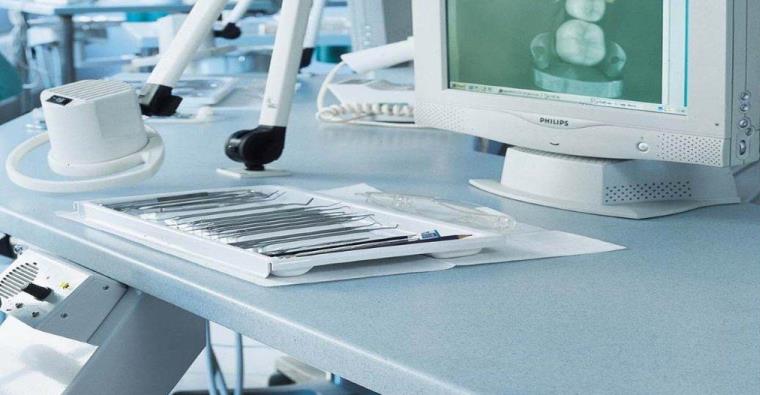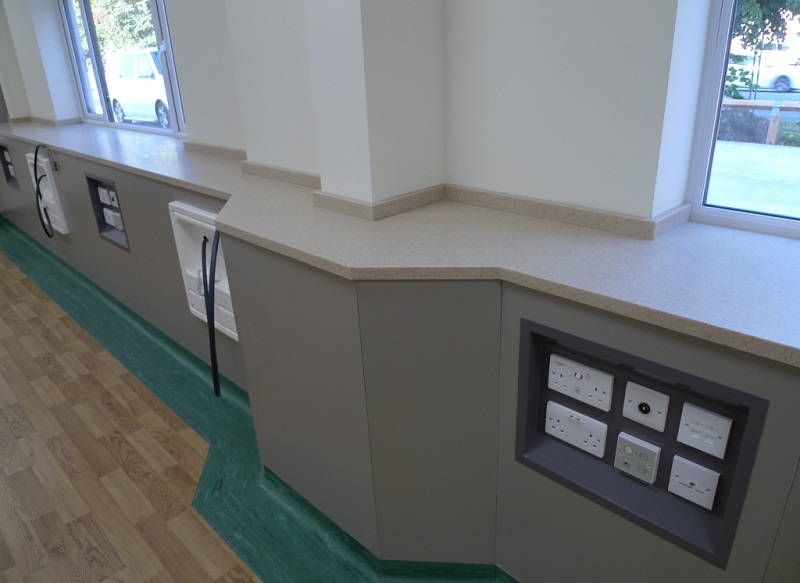
Why synthetic solid surfaces are the safest choice for hospitals and laboratories
Posted by Whitehall on 07th AugIt’s no secret that our hospitals and laboratories contain billions of harmful bacteria and facilities have to be designed around limiting the risks of contamination.
Cleaning measures help with everyday upkeep, but vigilant hygiene protocol should start with the building design itself. Using raw materials that are durable and designed to repel bacteria is the only way to ensure your environment stays clean.
Synthetic solid surfaces, like Corian®, Hanex and Hi-MACS®, have long been the material of choice for lab and hospital ward design due to their resistant properties and here’s why:

View the full Lacunar LTD case study
1. Non-porous and impermeable
Unlike natural materials, like wood and granite, synthetic solid surfaces don’t have miniscule pores across their exterior. Invisible to the naked eye, the pores in these natural materials can gather bacteria.
Synthetic materials, on the other hand, are completely non-porous. They are impermeable to all liquids and solids, making them resistant to bacteria and much safer for use within medical environments.
2. Durable and extremely hard wearing
Cut to shape using a Computer Numerical Control (CNC) cutting machine and with the ability to withstand temperatures of around 250°, it’s incredibly difficult to break or damage a synthetic solid surface.
This durability makes solid surfaces ideal for regular use within a medical setting where they may be subject to more natural wear and tear than your average domestic work surface.
3. Protected seams and joins
Over time, surface joins can gather dirt and grime, harbouring potentially dangerous bacteria.
However, synthetic solid surfaces are joined with purpose-built composite glue before being sanded down to create a seamless finish. This process helps to remove any dirt-collecting joins and makes the surface much quicker and easier to clean in the long run.
4. Stain resistant
The non-porous properties of synthetic solid surfaces means they are resistant to stains, mould and mildew. This is incredibly useful within medical and scientific settings, where surfaces may be regularly exposed to corrosive substances that may cause damage over a period of time. For this reason, synthetic surfaces represent an excellent long-term investment.
5. Compliant with hygiene regulation
Solid surfaces, like Corian®, are LGA-certified for their hygienic properties, meaning they comply with the European standard DIN EN ISO 846. This provides complete peace of mind for hospitals and laboratories, who know their surfaces meet the hygiene standards required to protect their patients and employees.
6. An affordable choice
Custom-built and templated to your plans, synthetic solid surfaces are cost-effective to produce and represent a quality long-term investment. A choice of manufacturers means there’s a surface to suit every budget and each surface comes backed by a guarantee.
Are you involved in specifying work surfaces for a hospital or laboratory? Talk to us about your project requirements today and we’ll help you find a solid surface material that meets your brief and your budget.
Back to blog


